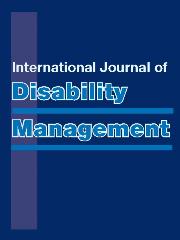Article contents
The Role of Organisational Culture in Sickness Absence
Published online by Cambridge University Press: 23 February 2012
Abstract
In the Dutch literature on occupational health and sickness absence many references can be found on organisational factors that influence the sickness absence. Many of those factors are related to the culture of an organisation. To classify and analyse those factors we used a well-known management model — the seven S model. After identifying the cultural aspects that might influence sickness absence, we developed a simple management tool consisting of 30 questions. The goal of the tool is to explain the organisational culture in relation to sickness absence. This explanation enables the organisation to choose interventions to change organisational aspects in order to prevent or to reduce the sickness absence in the organisation. We tested the tool with seven human resource (HR) managers in the governmental sector. They completed the checklist and the results were discussed with them in a face-to-face interview. To date, the checklist appears to be helpful in analysing the organisational culture in relation to sickness absence, but it still needs to be tested with a larger population.
- Type
- Articles
- Information
- Copyright
- Copyright © Cambridge University Press 2006
- 1
- Cited by




